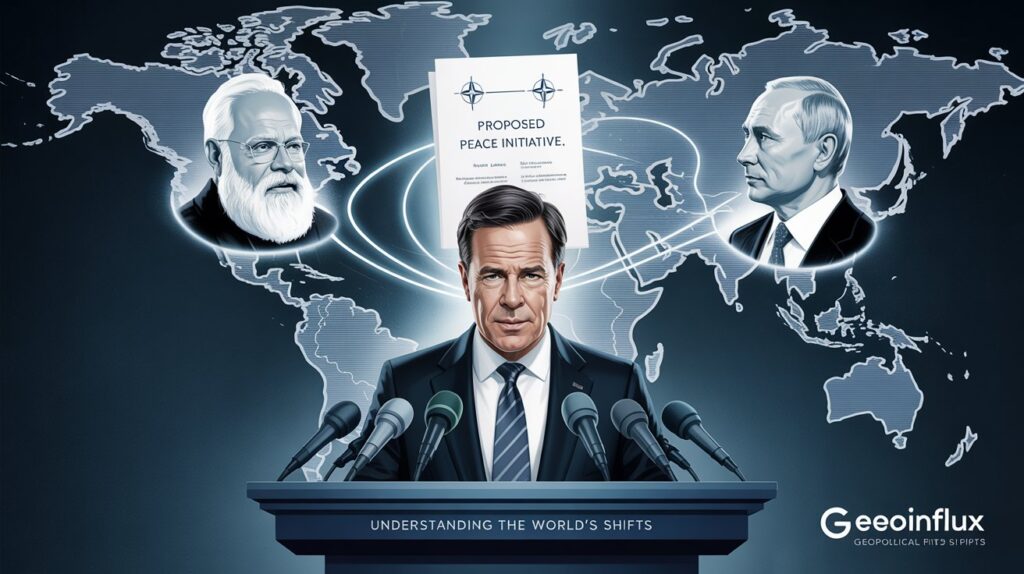NATO Chief Mark Rutte is accused of misrepresenting the Modi-Putin peace plan. This article examines NATO credibility, India-Russia relations, and the Ukraine conflict’s wider impact.
Did NATO Chief Mark Rutte lie about the Modi-Putin plan?
NATO Chief Mark Rutte has sparked a controversy after his claims about the so-called Modi-Putin peace plan. Many analysts suggest he exaggerated or misrepresented informal talks as a concrete proposal.
This not only questions NATO’s credibility but also puts India-Russia under unnecessary spotlight. Was India’s diplomatic role framed unfairly for NATO’s narrative in the Ukraine conflict?
Also Read: India-US News
Background: Why is the Modi-Putin peace plan controversial?
The issue gained traction when Rutte declared that Prime Minister Narendra Modi and President Vladimir Putin had discussed a “clear peace framework” for Ukraine.
Yet, both Indian and Russian officials denied such claims. Instead, they emphasised bilateral discussions on trade, energy, and security.
Critics argue that NATO’s credibility suffers when its leaders inflate stories. India and Russia’s relations, already under Western scrutiny, risk being distorted by NATO’s framing of the Ukraine conflict.
Analysis: What are the implications of Rutte’s claims for NATO and India?
If the NATO Chief misled the public, NATO’s credibility takes a serious hit. NATO has long been accused of shaping narratives for political convenience, and this episode reinforces that perception.
For India, the framing carries consequences. Delhi values its balancing act between Russia and the West, but being drawn into misinformation damages its diplomatic image.
This dispute shows how India and Russia’s relations are often manipulated to fit Western interpretations of the Ukraine conflict.
Strategic Insights: How does this affect India’s balancing act?
India continues its strategy of maintaining neutrality while engaging both Russia and Western partners. The Modi and Putin meetings have centred on energy, defence, and multipolar cooperation, yet NATO’s misinterpretation complicates the story.
By overstating India’s role in the conflict, NATO risks alienating Delhi. If NATO’s credibility weakens further, India may strengthen its reliance on Russia, making their relations even more central in the shifting geopolitical landscape.
Recap Table: What are the key takeaways from the Modi-Putin-NATO controversy?
| Question | Answer |
|---|---|
| Did NATO Chief mislead? | Evidence suggests exaggeration, if not outright misinformation. |
| Neutral mediator, protecting India-Russia relations. | India and Russia deny any formal Ukraine peace plan. |
| Why does it matter? | NATO credibility risks collapse, India risks misrepresentation. |
| What’s India’s position? | Neutral mediator, protecting India and Russia’s relations. |
FAQs
1. Did the NATO Chief really lie about the Modi and Putin’s plan?
Yes. Rutte suggested Modi and Putin had discussed a Ukraine peace plan, but official records deny this. Analysts say he misrepresented informal conversations, raising questions about NATO’s credibility.
2. What is the Modi-Putin peace plan according to NATO?
According to Rutte, it was a framework to end the Ukraine war. However, India and Russia clarified that discussions focused on bilateral issues. This proves NATO overstated India’s role.
3. How does this impact NATO credibility?
It damages trust. If NATO Chief Mark Rutte presents half-truths, global audiences, especially in the Global South, see NATO as manipulative. This undermines NATO’s credibility at a sensitive moment in the Ukraine war.
4. What role does India play in the Ukraine-Russia conflict?
India promotes dialogue but avoids taking sides. Modi has spoken with both Zelensky and Putin. However, Delhi rejects NATO’s framing that exaggerates its role, instead highlighting India and Russia’s relations as strategic but independent.
5. How does this affect India and Russia’s relations?
Despite NATO claims, Modi and Putin’s meetings strengthen cooperation in energy and defence. India-Russia relations remain robust, but Western narratives risk painting India as too close to Moscow.
6. Could NATO’s framing push India closer to Russia and China?
Yes. If NATO credibility erodes, India may tilt further toward Russia and even deepen its role in the RIC (Russia-India-China) framework. This weakens NATO’s influence over the Global South.
7. What are the wider geopolitical implications?
The controversy shows that information is now a battleground. NATO aims to shape the narrative of the Ukraine-Russia conflict, but exaggerations about Modi and Putin’s talks could instead strengthen multipolar alternatives.
Conclusion: What’s next in the Modi-Putin-NATO narrative?
The controversy over NATO highlights how fragile NATO’s credibility has become. By overstating India’s involvement in the conflict, NATO risks losing trust globally. Meanwhile, India-Russia relations continue to grow on their own terms, reinforcing India’s balancing act in a multipolar world. If NATO continues to distort, it may push India further from Western influence and closer toward a Russia-led axis.
References
- Reuters. India rejects NATO Chief’s remarks about Modi-Putin talks. September 26, 2025. Link
- Times of India. Careless, speculative: MEA says PM Modi didn’t call Putin, pans NATO Chief’s remarks. September 26, 2025. Link
- NDTV. PM Narendra Modi asked Russia’s Vladimir Putin plan for Ukraine, flagged US tariffs: NATO official. September 26, 2025. Link
- Economic Times. MEA terms NATO Sec’s remarks on Modi-Putin talks as incorrect, baseless. September 26, 2025. Link
- Indian Express. India MEA dismisses NATO Chief claim of Delhi now on phone with Moscow as entirely baseless. September 26, 2025. Link
- Hindustan Times. NATO boss on India tariffs: Narendra Modi asking Russia’s Putin to explain his Ukraine strategy. September 26, 2025. Link
- India Today. Careless: India rejects NATO Chief’s PM called Putin for Ukraine plan claim, says no such talk took place. September 26, 2025. Link

